Sabrina Zhang and Jack Prater on The Earth Prize and Global Environmental Projects
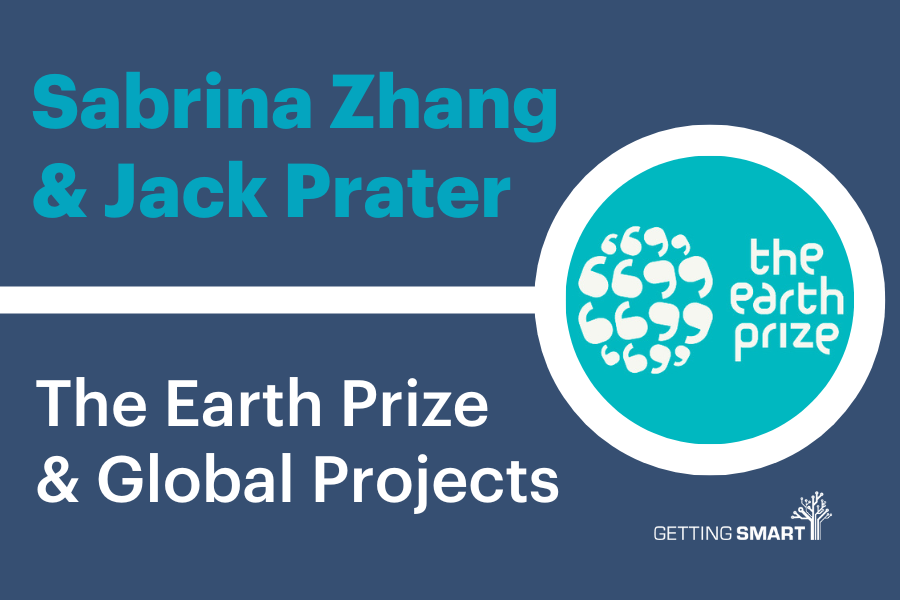
On this episode of the Getting Smart Podcast, Tom Vander Ark is joined by a high school student Sabrina Zhang. We are also joined by Jack Prater, one of Sabrina’s teachers at Polytechnic School in Pasadena, California. They recently collaborated as a mentor/mentee team in The Earth Prize competition, a $200k global competition for students to create solutions to climate-related challenges.
We’re really just trying to provide the resources the students need, they lead the conversation.
Jack Prater
Transcript
Tom Vander Ark: Jack, why is it important to engage high school students in global challenges?
Sabrina and Jack: Ah, you know, I feel like at our school, in particular, the importance comes directly from the students. Our students have always been really active in their community and community service. And so it’s really just listening to the students and being responsive to them and what they’re interested in. Like on our campus, it initially started off with composting. Students were really concerned about food waste, what they were seeing ending up after lunch—the trash that could be better used. And it got them thinking about better ways that we could do things on campus. Then the administration found ways to support them, and now we’re composting a significant portion of our food waste. And just the idea that the students are really interested in how to preserve the world that they’re going to move into. Sabrina has found the Earth Prize and has been interested and instrumental in that. Other kids are working towards having our school go to 100% solar in the next five or ten years. We have students designing and building a club that’s creating a solar car to race cross-country. It’s all about what the students want, and as faculty and administrators, we’re really just trying to provide the resources that students need.
Sabrina and Jack: They’re the ones telling us this is what’s important to them, and so we’re doing everything we can to support them in whatever they have the energy and drive to accomplish.
Tom Vander Ark: You’re listening to the Getting Smart podcast. I’m Tom Vander Ark, and I have the pleasure today of being joined by Polytechnic School senior Sabrina Zhang. Hi, Sabrina!
Sabrina and Jack: Hi, it’s so nice to be here.
Tom Vander Ark: It’s great to have you, and Sabrina is joined by one of her teachers, Jack Prather. Jack, how long have you been at Polytechnic?
Sabrina and Jack: I’ve been a teacher here since 2011.
Tom Vander Ark: Polytechnic is a terrific K-12 school in Pasadena, is that right, Jack? We love Polytechnic because they listen to students and engage them in real-world learning and global challenges.
Sabrina and Jack: Yes, sir.
Tom Vander Ark: Sabrina, you won some global distinction recently. We learned that you were a finalist in the Earth Prize. What is that, and how did you discover it? Why did you decide to enter?
Sabrina and Jack: Yeah, so I discovered the Earth Prize, which
issue related to sustainability and improving the Earth. Through a series of steps, participants create a business plan and an idea, fleshing that out in multiple stages so that it can become a concrete solution to a particular problem in environmental sustainability. I came across this competition honestly through social media. I’d been following different organizations to keep track of new environmental initiatives, and the algorithm suggested the Earth Prize. When I saw it, I was really excited because a lot of what I had been researching on my own for a little project I like to call Agrovision aligned with the competition’s goals. The Earth Prize was the perfect opportunity, not only for me to find a network of students interested in environmental sustainability but also to connect with mentors and leaders who could guide me through developing a business proposal to help bring my idea to life.
Tom Vander Ark: That’s very cool. It sounds like it’s the EarthPrize.org, a relatively new global prize by a European foundation, with a $200,000 first-place award. It’s well-advertised, and it’s exciting to see applicants from all over the world.
Sabrina and Jack: Yeah, this year, we had about 1,100 or 1,500 teams from around the world. I met participants from places like Turkey, Australia, and the UK over Zoom, so it’s been a fascinating experience.
Tom Vander Ark: So, tell us about your solution, Agrovision. What is it, and where did it come from?
Sabrina and Jack: Agrovision really started as a passion project during the pandemic. My dad and I spent a lot of time discussing new green technologies, and one recurring topic was vertical farming. I was fascinated by it, and at the time, Amazon was exploring business deals related to vertical farming, especially with Whole Foods. As I researched more about vertical farming, I wanted to understand why this kind of agricultural technology was being developed and what issues in traditional farming were driving it. One key problem I discovered was plant pathology—specifically, plant diseases that cause significant crop loss. I learned that almost 40% of crop loss is due to plant diseases, which was something I’d never realized had such a large impact. When you think about the supply chain and the amount of produce lost early in production, it’s clear that improving crop health could make food more affordable and accessible to more people.
That got me thinking about solutions for monitoring and managing plant health. Since there isn’t always a cure for plant diseases, I thought, why not develop a monitoring process to track plant health and detect diseases early? This way, affected plants could be managed or removed, reducing the threat to the surrounding crops. So, I started reaching out to friends and classmates across the U.S. to see if anyone was interested in agricultural technology. After some conversations, I found a niche in computer vision, machine learning, and robotics, which led to the creation of Agrovision. It’s a system designed to use hyperspectral image processing for disease detection and health monitoring in crops, supported by robotics and image processing.
Tom Vander Ark: Jack, are you a specialist in computer vision and machine learning? What was your first impression when you heard about the Earth Prize, and how were you able to help coach Sabrina through this process?
Sabrina and Jack: No, no, I’m not a specialist in that area. But I was very impressed by Sabrina’s idea. I think the Earth Prize does an excellent job of helping students understand that global challenges are big, but they’re capable of taking action. Providing students with a platform to develop these plans, and offering a substantial prize to help advance successful ideas, is inspiring. My role with Sabrina was mainly about putting her in a place where she could refine and expand on her ideas. She initially reached out to some colleagues, but I helped her strategize and think critically about which direction the technology should go and what the next best steps might be. It was really about helping her craft her vision and find ways this technology could be most impactful.
Tom Vander Ark: Sabrina, I noticed that a number of Earth Prize teams had three or four members, but you largely went through this process alone. I imagine, though, that you worked with a network of people to climb the learning curve for computer vision and machine learning applications to support Agrovision. Could you tell us about the learning curve with these tools?
Sabrina and Jack: Sure! When I first entered the Earth Prize, I had been thinking about this idea for over a year and a half, so it was well-developed in some respects. I’d already spoken to people passionate about feature extraction algorithms in machine learning and agricultural robotics. For example, I connected with individuals in agriculture technology through another competition, the Diamond Challenge, where I met experts grounded in this field. Talking with both adults and students with different perspectives helped me feel confident about combining ideas for Agrovision. It’s not just one specific thing; it’s a combination of features from various technologies to create a better future. That learning curve was also helped by my passion for research—I can easily get lost in rabbit holes when I find an interesting topic!
Tom Vander Ark: I’d love to know more about that, Sabrina. Was most of this research done online? Did you take extra courses or interview experts? What were your main research strategies?
Sabrina and Jack: Most of it was online research, definitely. I should mention that acquiring a hyperspectral camera, which my product uses, is challenging. That’s another reason why I pursued the Earth Prize—its financial reward could help me further develop this idea. In my junior year, I also took AP Biology and worked with one of my teachers to publish a research paper on CRISPR-Cas9 disease resistance for rice crops. Outside of class, I deepened my understanding of plant pathology by exploring the kinds of diseases crops face. This research helped me see how computer vision might support crop health. So, through AP Biology, publishing the research paper, and doing additional exploration, I worked on a proof of concept for Agrovision.
Tom Vander Ark: It’s amazing that even a few years ago, the tools you’re using—computer vision, hyperspectral imaging, machine learning—weren’t as accessible as they are now. It’s exciting that young people like you can access specialized tools to work on world-changing solutions. Do you feel like you’re living through an interesting time, with these tools available to you?
Sabrina and Jack: Absolutely. My dad often says, “When I was your age, I didn’t even know these things existed.” Conversations with him, my family, and Mr. Prather often remind me how grateful I am to have access to meta-analysis papers and resources that aid my research and development process.
Tom Vander Ark: That’s great. Your enthusiasm is inspiring. I love that you’re using tools that, even a few years ago, weren’t accessible to high school students. I think it’s remarkable what you’ve been able to accomplish at this stage in your life. What’s next for Agrovision? Do you have a vision for scaling it, or are there specific steps you’re planning to take in the coming months?
Sabrina and Jack: Yes! The Earth Prize was an incredible learning experience, and it made me realize that there’s still so much to do. One big focus now is moving from the proof of concept phase to a minimum viable product. I’d like to create a prototype that I can test in real agricultural environments. This might involve working with local farms or agricultural research stations that are open to testing new technology. My next steps are to gather data in real settings and refine the machine learning algorithms for accuracy in disease detection. And of course, funding is another area I’m working on, as hardware and equipment like hyperspectral cameras are costly.
Long term, I’d like to build partnerships with agricultural universities and companies that are interested in crop health and sustainability. I want Agrovision to be a system that not only helps farmers increase their yield and prevent crop loss but also contributes to global food security. In the end, I envision Agrovision as an affordable solution accessible to all types of farmers, from small farms to large agricultural corporations.
Tom Vander Ark: That’s a very exciting roadmap! Jack, from your perspective as a mentor and someone who’s seen Sabrina’s journey, what advice would you give other young people who are passionate about similar projects or who are looking to enter competitions like the Earth Prize?
Sabrina and Jack: My advice would be to start with something you’re passionate about. Sabrina’s project, Agrovision, is a perfect example—she saw a real problem, did her research, and built a solution around it. If you’re interested in environmental issues or technology, look for ways to combine those interests into a project. Competitions like the Earth Prize give you the structure to take your idea and turn it into something actionable. Also, don’t be afraid to reach out to mentors or experts in the field, as they can provide valuable feedback and help you navigate challenges.
Another tip is to treat competitions as learning experiences rather than focusing solely on winning. Sabrina took the time to learn from her peers and the Earth Prize mentors, which was crucial in refining her project. These competitions aren’t just about the prize; they’re about growth, learning, and building something that can have a lasting impact.
Tom Vander Ark: Sabrina, I really admire your work on Agrovision and the energy you bring to solving a challenging problem in agriculture. Before we wrap up, is there anyone you’d like to thank or any final words of advice you’d like to share with other young innovators?
Sabrina and Jack: Definitely! I’d like to thank my family and Mr. Prather for their support throughout this journey. They’ve encouraged me to keep going, even when things got difficult. To other young people, I’d say, “Don’t be afraid to pursue something you’re passionate about, even if it seems daunting.” When I started working on Agrovision, I didn’t have all the answers, but I learned along the way. And remember, there are always people out there who want to help you succeed, so don’t hesitate to ask for advice or guidance.
Tom Vander Ark: Thank you, Sabrina and Jack. It’s been inspiring to hear about Agrovision and the journey you’ve taken with the Earth Prize. I’m sure we’ll hear more about your work in the future. Good luck with Agrovision, and thank you for joining us on the Getting Smart podcast.
Sabrina and Jack: Thank you so much, Tom! This has been an incredible opportunity to share our story. We appreciate it!
Tom Vander Ark: And that’s a wrap for this episode of the Getting Smart podcast. Thanks to Sabrina and Jack for sharing their insights, and thanks to all our listeners for tuning in. Keep learning, keep innovating, and keep pushing the boundaries of what’s possible. See you next time on the Getting Smart podcast!
Links:


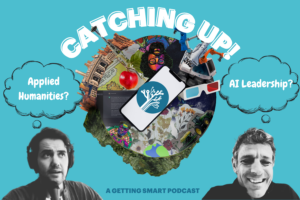

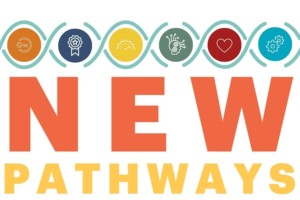
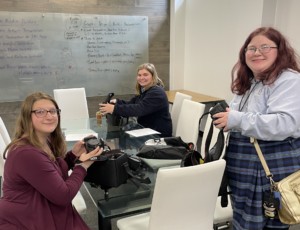
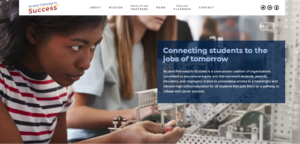
0 Comments
Leave a Comment
Your email address will not be published. All fields are required.